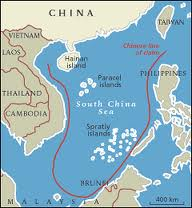
Practical information
Seminar with James R. Holmes, associate Professor of strategy at the Naval War College, Senior Fellow at the University of Georgia School of Public and International Affairs.
Chair: Céline Pajon, Research Fellow, Center for Asian Studies, Ifri.
Chinese words and deeds vis-à-vis Southeast Asia bring Chinese attitudes into sharp focus. Officials have asserted ‘indisputable sovereignty" over most of the South China Sea. In 2010, the Chinese foreign minister pointedly told his Southeast Asian counterparts that ‘China is a big country and other countries are small countries, and that"s just a fact." Such language is reminiscent of Richard Olney"s insistence that Washington was ‘practically sovereign" in the New World. Yet even Olney and Cleveland never dreamt of actually asserting title to the Caribbean basin, despite their overbearing diplomacy during the Venezuelan border crisis. If Beijing is pursuing a Monroe Doctrine by another name, it"s a hyper-Monrovian offshoot of the original. In rhetorical terms, China appears to be a regional strongman in the making.
The seminar will be held in English.
Speakers
Other events

EV Supply Chains for Japan and Europe: Strengthening Economic Security
Economic security aims to ensure the resilience of supply chains for key industries: the case of electric vehicle production in Japan and Europe will be discussed.

From Ambition to Action: Exploring Technological Partnerships with India
The 16th EU-India Summit, held on January 27th in New Delhi with European leaders António Costa, Ursula von der Leyen, and Prime Minister Narendra Modi, marks a significant milestone in deepening EU-India relations. At the same time, official bilateral visits from EU member states are on the rise, including that of the French President, who visited India in February to participate in the Artificial Intelligence Summit. As India asserts its technological ambitions and seeks to reduce its dependence on China, Europe is stepping up its efforts to diversify its strategic partnerships.






